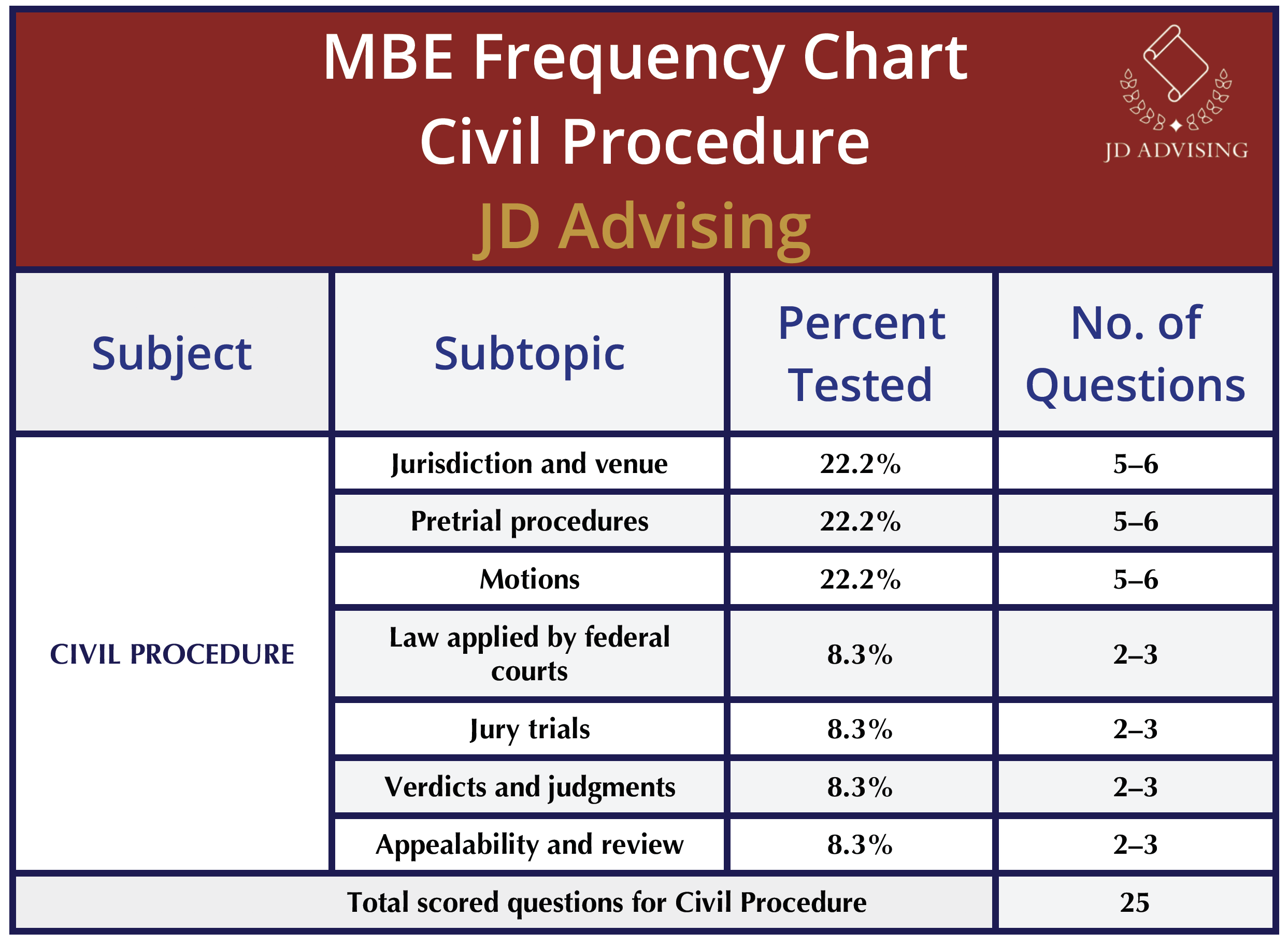Tips for Civil Procedure On The Multistate Essay Exam
Tips for Civil Procedure On The Multistate Essay Exam
This time in our MEE tips series we address Civil Procedure. When thinking about Civil Procedure on the Multistate Essay Exam, you should consider two questions: how is it tested? And how often is it tested? In the last 10 years (20 administrations), we’ve seen Civil Procedure on the Multistate Essay Exam 17 times. Interestingly, two of those three times we didn’t see it have come in the last two years. Overall, Civil Procedure is the most frequently tested subject on the Multistate Essay Exam. Thus you’d do well to give it a significant amount of attention in your studying!
Tips for Civil Procedure On The Multistate Essay Exam
Standard disclaimer: make sure you are preparing for all of the subjects! Statistics regarding the frequency of Civil Procedure should be used in determining how much to study for the subject. You shouldn’t skip studying for any subject or topic! Spend the most time on the subjects that are the most likely to come up. But do not ignore any subject!
Here are the most commonly tested topics in Civil Procedure on the Multistate Essay Exam:
Personal Jurisdiction
Personal jurisdiction tends to come up about once every five years in Civil Procedure on the Multistate Essay Exam questions. However, it was recently tested in back-to-back years, so nothing is off the table. Personal jurisdiction can be general (consent, presence, or domicile) or specific. Specific personal jurisdiction requires a look to the long-arm statute of the state the court sits in. There must also be a second inquiry into the constitutionality of the exercise of specific personal jurisdiction. To be constitutional under the due process clause, a non-resident defendant must have established minimum contacts with the state. The exercise of personal jurisdiction must not offend traditional notions of fair play and substantial justice. Look for purposeful availment of the benefits and protections of the state, and then examine the quality of the contacts.
Subject Matter Jurisdiction
There are three categories of subject matter jurisdiction that turn up in Civil Procedure on the Multistate Essay Exam questions.
- Federal question jurisdiction involves a federal court’s ability to hear cases that address a federal question. The question must appear in the plaintiff’s well-plead complaint.
- Second, federal courts can hear cases based on diversity jurisdiction, which has two requirements: 1) there must be complete diversity of citizenship between the defendants, and 2) the amount in controversy must be over $75,000.
- Finally, federal courts can hear cases based on supplemental jurisdiction. This is an issue when there is a jurisdictional basis for one claim but not the other. Remember that plaintiffs cannot add claims against non-diverse parties if the sole basis for subject matter jurisdiction is diversity.
A defendant can remove a case from state court to federal court if the plaintiff could have initially brought the case in federal court. However, a defendant may not remove a case if he is sued in his home state and the only basis for removal is diversity.
Summary Judgment Under Rule 56
A summary judgment motion will be granted only if there is no genuine issue as to any material fact and the movant is entitled to judgment as a matter of law. The moving party must support its motion for summary judgment with depositions, documents, electronically stored information, affidavits/declarations, stipulations, admissions, interrogatories, or other materials. If the moving party produces such evidence to demonstrate that there is no genuine issue of material fact, then the burden shifts to the non-moving party. It must produce evidence of the same types to show that there is a genuine issue of material fact for trial. The evidence will be viewed in the light most favorable to the non-moving party.
Temporary Remedies
Temporary remedies such as preliminary injunctions and temporary restraining orders (TRO) are occasionally tested in Civil Procedure on the Multistate Essay Exam. A TRO can be issued without notice to the adverse party but only in limited circumstances and for a limited time. A plaintiff must demonstrate a risk of immediate and irreparable injury. The TRO can last only long enough for the court to consider and resolve a request, but no longer than 14 days.
A preliminary injunction is an equitable remedy that seeks to preserve the status quo. If granted, the matter must then be tried within 6 months. The court considers four factors when deciding whether to grant a preliminary injunction. First, the significance of the threat of irreparable harm to the plaintiff if the injunction is not granted must be considered. Second, the court weighs this harm with the harm to the defendant if the injunction were to be granted. Third, the plaintiff needs to be likely to succeed on the merits. Finally, the public interest must be considered.
Seeking MEE Expertise?
🌟 Freebies & Discounts
- Free Bar Exam Resource Center: Explore for leading guides, articles, and webinars.
- Expert-Crafted Bar Exam Guides: Unveil insights on high-frequency MEE topics and strategies for success.
- Free Webinars: Engage with top bar exam experts.
🔥 Top-Rated MEE Resources
- MEE One-Sheets: Boost your confidence with our most popular bar exam product!
- Bar Exam Outlines: Our comprehensive and condensed bar exam outlines present key information in an organized, easy-to-digest layout.
- NEW MEE Mastery Class: Unearth focused, engaging reviews of essential MEE topics.
- Bar Exam Crash Course and Mini Outlines: Opt for a swift, comprehensive refresher.
- MEE Private Tutoring and feedback: Elevate your approach with tailored success strategies.
- MEE Course: Preview our acclaimed five-star program for unmatched instruction, outlines, and questions.
🔥 NEW! Dive deep into our Repeat Taker Bar Exam Course and discover our unrivaled Platinum Guarantee Pass Program.






